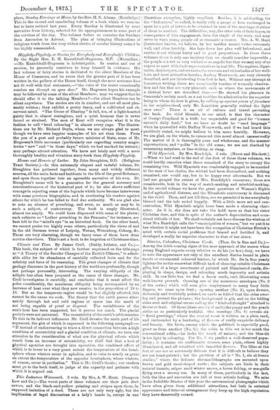This Indenture Witnesseth. 3 vole. By Mrs. A. W. Hunt.
(Sampson Low and Co.)—The worst parts of these volumes are their pale drab covers, and the black-and-yellow printing and stripes upon them, in supposed imitation of a deed. These are not only very ugly, but the implication of legal discussions at a lady's hands is,, except in one
illustrious exception, highly repellent Besides, it is misleading, for the "Indenture," so called, is really only a gauge of love exchanged in sport by a pair of lovers, to be returned in case of the marriage of either of them to another. The difficulties, nay, the utter ruin of their hopes, in consequence of this engagement, form the staple of the story, and may serve to warn young people off so romantic a course. Mrs. A. W. Hunt (heretofore known, we believe, by her maiden name) writes extremely well, and often forcibly. She lays down her plan well beforehand, and carries it out without hurry and in good proportions. In these three volumes there is only one incident that we should consider impossible ; the people are not so very wicked or so angelic but that we may any of us expect to meet with their representatives in real life. The squires, digni- taries, shopkeepers, and servants, the reverses and vicissitudes of her well- born and most attractive heroine, Audrey Wentworth, are very cleverly described, and are interesting from first to last. Without any attempt at humorous writing, there are occasionally touches of womanly observa- tion and fun that are very pleasant, such as where the movements of
a clerical lover are described thus He showed his pleasure in Osmunda's society much as a cat testifies its admiration for the superior being to whom its love is given, by rubbing up against pieces of furniture in her neighbourhood, only Mr. Lauriston generally rubbed the light ones over." There is an air of culture and travel pervading the book. Its chief blemish, to our mind, is that the character of George Coupland is a trifle too respectable and good for "human nature's daily food ;" but we have no doubt he "used language" when he quarrelled with Dudley Wentworth, and if we had heard this positively stated, we might believe in him more heartily. However, we are glad, on the whole, to commend this novel almost unreservedly The matter of it is thoroughly pure and wholesome, and the manner unpretentious, and " polite " in the old sense ; we are not shocked by unmeaning surprises, or fine-writing, or slang.






































 Previous page
Previous page